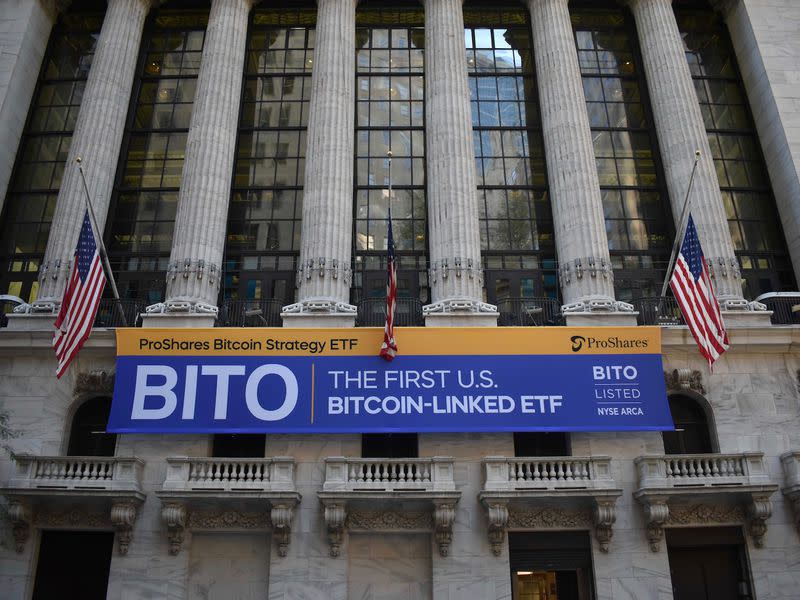4 Reasons Not to Invest in Bitcoin Futures ETFs

Bitcoin futures exchange-traded funds (ETFs) have arrived in the U.S. with the Securities and Exchange Commission (SEC) approving ProShares’ Bitcoin Strategy ETF (BITO), and a string of others is expected to follow.
Should you buy any of these?
As I’ve told subscribers to my Crypto Capitalist Letter, the short answer is no.
Mark E. Jeftovic is the CEO of easyDNS and author of The Crypto Capitalist Letter.
Here’s why:
We have better ways to gain our exposure to bitcoin, and here we’ll look at why a bitcoin futures ETF has drawbacks even as compared to a spot ETF.
The difference between a futures ETF and a spot ETF is that the latter holds the underlying asset in treasury. Think of a pile of gold in a vault somewhere, against which shares are issued and sold on the open market. Owning the shares correlates to claims on the assets in custody. In spot ETFs you can even redeem your shares for the assets they represent.
This is also possible in cryptocurrency ETFs and closed-end funds. You can redeem your shares for the underlying bitcoin, or ethereum or whatever the vehicle is invested in.
Contrast to the former, the futures ETFs. While some commodities futures contracts are for settlement in the commodity itself (urban legends abound of flat-footed traders waking up the morning of their contract’s settlement day to discover a truck pulling into their driveway and dumping a few tons of sugar or coffee beans onto their front lawn), the bitcoin futures ETFs are cash settled.
That means no matter what happens to the price or what you decide you want to do with your positions in the future, there is no option for redemption of the underlying asset, you have no claim on actual bitcoin.
You are only a party to a contract to settle in cash at some future date.
One of the main attractions to assets like gold and bitcoin is the absence of counterparty risk. You may face custodial risk, which is a separate issue. But in terms of counterparties, when you own gold or you own bitcoin, the price is the price, and you own what you own regardless of how that affects anybody else in the world.
Read more: Why a Bitcoin Futures ETF Is Bad for Investors - Michael J. Casey
Below are four reasons why we’ll be avoiding these ETFs, followed by what you should buy instead.
Reason #1: Counterparty risk
In the movie “The Big Short,” you may remember how the protagonists (who had long predicted that the mortgage-backed securities would blow up markets) experienced a peculiar kind of angst as their trades were finally vindicated, only to find their profits in jeopardy as cascading failures blew up their counterparties. FrontPoint Partners, in particular (the team led by Steve Carell’s character), found themselves in the surreal position of their own parent bank becoming insolvent from its exposure to derivatives FrontPoint had shorted heavily.
Cash-settled futures ETFs are all derivatives, and thus they all have counterparty risk.
Reason #2: Diluted exposure
Owing to SEC regulations (consumer protection, and all that), the bitcoin futures ETFs can only mimic exposure to bitcoin of up to 85% of the their net asset value (NAV). The other 15% has to be “safer” instruments like Treasury bills or bonds to provide some kind of cushion.
Reason #3: Decay
As the future contracts settlement date approaches, they have to be rolled over to the next period. That causes decay as this entails transaction costs on closing out and opening new positions.
On top of that, there are the actual fund fees, which in the case of BITO is another 0.95%. (The “contango” phenomenon refers to when prices for longer-dated contracts are more expensive than shorter-dated ones.)
If you own bitcoin directly, or even a spot ETF, you don’t have decay. You’re just long bitcoin and the only thing you really have to worry about is the actual price.
Reason #4: Divergence
Goldbugs have been complaining for decades how the paper futures markets don’t reflect the underlying value of spot gold. We see this get conspicuously out of whack during high volatility episodes like #silversqueeze, earlier this year – when physical silver was trading at premiums north of 30% on the futures price.
We can see the opposite happen, like when oil futures traded at a negative value for a day on April 20, 2020.
In that sense, trading futures ETFs is really more about betting on the price of the futures itself than on the underlying asset that the futures represent. The spot price and the futures price are two different things that mostly, sort of, correlate. But not always. Those times when they don’t are usually quite chaotic.
Read more: Contango Conmigo: Why a Bitcoin Futures ETF Could Be a Bloody Ride - David Z. Morris
What to do instead
Here in Canada, this is no problem. Bitcoin and ethereum ETFs have been around for awhile now and we have multiple options to choose from.
In the U.S., it can be trickier.
If this is the case, then here’s two options: the Bitwise 10 Crypto Index Fund (BITW) and the Grayscale Trust Bitcoin Fund (GBTC). (Grayscale is a unit of Digital Currency Group, which also owns CoinDesk.)
Grayscale has made no secret of its intention to convert to a spot ETF, and with these futures ETFs approved, they have already refiled the paperwork to do so.
The Bitwise fund is mostly allocated to the top two cryptocurrencies by market cap, with 63% in bitcoin and 26% in ethereum. The remaining 10% is split across other layer 1 cryptos like cardano, litecoin, polygon and cosmos.
Let the bitcoin futures ETFs increase the profile of the space and open up the asset class to previously inaccessible investors such as pension funds. But for our purposes, these instruments are for other people.

 Yahoo Finance
Yahoo Finance 